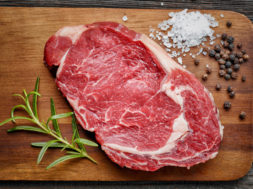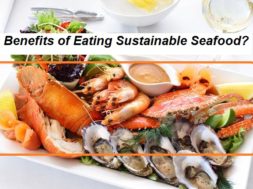Meat has been in the diet for since the emergence of mankind and a large number of people round the world eat meat on a regular basis. In this article I want to examine whether meat eating is good for our health and what effect meat consumption has on the environment.
Some facts about meat: Meat is generally defined as being the tissues from the muscle of animals. For the purposes of this article I’m sticking to poultry and the meat from mammals such as cows, pigs and sheep.
- Red or white. Red meat is meat that contains more myoglobin, a molecule that contains iron which gives it its red colour. It is red when raw and not white when cooked. Generally red meat has been given a bad press with reported links with cancer and raised cholesterol. However the evidence behind these links is weak and eating meat on a regular basis will be healthy for most people, as long as the rest of the diet is healthy. In fact red meat with its higher levels of iron is likely to improve the health of most people, especially women of reproductive age who lose a lot of blood. On top of the iron boost, red meat generally contains more zinc and vitamin B12 than the white meat in chicken and turkey. Having looked at the data across a number of important vitamins and minerals, beef and lamb will give more nutritional value pound for pound than chicken and pork. However be aware that most of the nutritional value is in the lean cuts and not in the fat. It is also likely that if the animal was given a good life then the quality of its meat will be better.
- Domestic or wild. The meat of wild animals virtually always contain proportionately less fat and more protein than that of their domestic counterparts. In many species there is more polyunsaturated fat in the wild population and in particular more of the healthy omega 3 fats. When it comes to vitamins and minerals it is harder to see a consistent pattern of difference. It would be safe to assume that eating wild meat offers more nutritional value than the equivalent domestic meat. The reason for this is partly because the wild animals are more active and therefore have a healthier proportion of protein to fat. The other is that they will eat more omega 3 fats. Omega 3 fats are found in greater amounts in wild plants than in domesticated plants given to domestic animals in their feed.
Meat and Health
The upside: Meat contains a bucket load of nutrients that are vital for our well being. Some of the following nutrients are found in significant quantities in meat:
- Protein in the form of whole protein. Whole protein contains the full range of amino acids that make up proteins. This is important as it is possible to have health problems if one of the 8-10 essential amino acids is in short supply.
- Iron in the form of heme iron which is more easy for us to absorb than iron contained in plants such as spinach. The iron in plants can be anywhere from 2-10 times harder to absorb than heme iron.
- B vitamins are found in good amounts and these are vital for health with low levels being associated with mental illness and low energy. One of the B vitamins, B12 is unique to animal sources and so is a big issue for vegans.
- Calcium and vitamins D and A are found in good quantities in meat and especially liver. These are vital for the health of our skeleton, and for health in general.
- Carnitine is a chemical found in meat and in our bodies that helps us burn fat. By eating meat we get more of it. There is good evidence that it can improve fertility, especially in males. It is also often linked with increased due to its fat burning abilities. Evidence for this isn’t so clear cut though.
- Despite a reputation for containing unhealthy fat, a lot of fat in meat is both essential and good for health. Monounsaturated fats and polyunsaturated fats are both present in all meat.
The controversy: Meat gets a bad press from many quarters on the basis that it can be bad for health. Much of the criticism is not backed up by firm evidence however. Some of the main issues are:
- Cholesterol content is high in many meats. However, the idea that dietary cholesterol is a factor in heart disease is plain wrong. Blood cholesterol levels are closely controlled by the liver, and excess in the diet will rarely lead to excess in the blood. Also there is increasing evidence that cholesterol levels need to be at what many consider a “high level” for optimum health. This concept that a high level of cholesterol in the blood is between 200-250mg/dL has come about as a result of drug companies efforts to justify an ever widening prescription rates for their profitable drugs known as statins.
- Saturated fat content in meat is also often quite high, although you may be surprised to learn that the healthy monounsaturated fat that people associate with olive oil, is found in larger amounts in most meat than is saturated fat. However, while there is some evidence that a large intake of saturated fat can raise blood cholesterol levels, there is not much good evidence that links meat consumption with either heart disease or an increased likelihood of death.
- Meat, and especially intake of red meat has been linked with various cancers. However it is important to realise that the studies that find these links, like many in nutritional science are epidemiological. These epidemiological studies use large groups of people in their studies. So far so good. However with such large groups, or cohorts as they are often called, it is impossible to control confounding factors. One example in the case of red meat is that with all the bad press it gets many health conscious people eat less of it. These health conscious people are unlikely to smoke, take drugs or overconsume alcohol. Is it any surprise therefore, when a large study of red meat consumption finds that those eating most of it, get a few more cases of certain types of cancer? More meaningful are tightly controlled studies where other variables, such as smoking can be eliminated by selecting study participants carefully. These more rigorous studies have not found links between red meat consumption and cancer.
The downside: However there are some aspects of meat that could be a concern for health. These are:
- Use of antibiotics. The presence of antibiotics in the meat we eat undoubtedly reduces the risk of food borne infection and poisoning. However it has also led to the evolution of superbugs, that are resistant to most antibiotics. It is surely better for animals to be given more space so they can avoid living among the excrement of themselves and potentially sick animals, rather than use drugs to counter these problems.
- Use of growth hormones. Growth hormones are used widely in the North American feedlots, although they are banned in the EU. It is commonly assumed that hormones are broken down during the digestive process and therefore cannot cause any effects in humans. However, intact proteins and lipids do survive into the intestines, where a proportion can be absorbed intact through the walls of the intestines into the blood. Once absorbed it only takes a very small level of hormones to produce an effect, and it was evidence of hormonal disruption in a number of human populations that caused the EU to ban growth hormones in meat1.
- Processing of meat via smoking or additives, such as preservatives and dyes. The epidemiological evidence that smoked foods can be bad for health has more merit than the case against red meat. Studies using more specific populations with fewer confounding factors point to a link between excessive smoked food consumption and some cancers such as stomach cancer. As with many things it is probably a case of eating these products in moderation rather than eliminating them altogether.
In summary eating meat is healthy for most people. Most of the scary headlines you come across about the need to cut down on meat consumption are not founded on strong evidence. Let’s face it, many sub populations of human beings, over many millennia, have successfully lived on little other than meat and thrived. Equally, it is true that other populations have survived with very little meat, especially in some tropical areas. However meat is a high quality nutritional food and to eliminate it completely can sometime cause nutritional deficiencies.
Meat and endurance exercise.
As a general rule carbohydrates are needed both before and during long endurance workouts. By long I mean of over 90 minutes duration. However it is not just your reserves of carbohydrate energy, called glycogen, that you use up during endurance exercise. You also use up protein from your muscles and immune cells, as well as essential fats from hormones and damaged cells. Many vitamins and minerals can be depleted after a long workout also through sweat and urine. Where does meat come into all this?
Meat for recovery: Well meat, as mentioned above contains some good quantities of certain nutrients that can really help an athlete recover from long and hard endurance sessions. A number of minerals are lost during long hard endurance sessions. The main ones are Magnesium, zinc, iron, copper, calcium and chromium. Magnesium is lost in sweat and urine. Meat is not the best source for magnesium however. Zinc also is lost through sweat and urine and meat is one of the best ways of recouping this loss quickly. Iron is perhaps the best known of the minerals that can be lost, especially during long distance runs as blood cells rupture and the iron they contain is then lost in urine. Meat again is one of the best ways of recovering the iron.
So while it is possible to be a successful athlete and avoid meat altogether, it is certainly the case that meat can be a quick way to regain key nutrients that are depleted during long endurance exercise.
Meat and weight: If you are concerned with weight management, then meat is not a major problem. It does not cause weight gain easily and is pretty effective at shutting down the appetite before too much is eaten. In fact for many people eating only a little meat introducing more meat is often a useful way of reducing weight.





